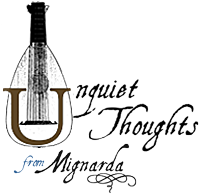Reflections

After fourteen years of sharing a panoply of Unquiet Thoughts, we pause to reflect on some of the major themes running through our series of quotations and essays. The primary focus of this series has always been to highlight our work in preserving the essence of early music in our modern age, and pointing out why that might be worthwhile. But we also like to offer commentary on the state of our shared planet, our observations on fallen empires, and our understanding of historical precedents that may help explain how we got to where we are today.
While most of our activity of late on Unquiet Thoughts has been devoted to recordings, we would like to offer our readers a taste of our old format. A device we have employed in the lengthening shadows of this blog’s past is sharing quotations from the vast collection of reading material that fills floor-to-ceiling shelves and accumulates on every available surface—what we call the Mignarda Reading List. We may be unusual in today’s world in that don’t have a television in our house. Instead, we read books.
Below is a handful of quotations that outline some of the themes of our blog, drawn from our current reading list with examples that include books, journals, and other miscellaneous scribblings.
Music, Science, Time, and Polyphony
“The heavenly motions are nothing but a continuous song for several voices, to be perceived by the intellect, not by the ear; a music which, through syncopations and cadenzas as it were, progresses toward certain pre-designed six-voiced cadences, and thereby sets landmarks in the immeasurable flow of time.”
– Johannes Kepler (1571 – 1630), Harmonices Mundi Libri V, 1619
Harmony
“It is harmony that causes the entire world to exist and that spreads itself throughout the universe, and without harmony all the elements and nature would soon be dissolved. The harmony that is born of these different elements only takes shape through their contrasts with one another, just as the harmony that caresses our ear so sweetly is formed by the difference between the voices or the instrumental sounds.”
– Mercure galant, 1680, from Patricia Ranum, The Harmonic Orator, Pendragon Press, Hillsdale, 2001.
Feudalism
“In general, one can say that a feudal state is one in which all the members of the ruling class form a feudal hierarchy with a chief lord or suzerain at its peak…among the feudal monarchies, it is necessary to say that all that is required to make a feudal state into a feudal monarchy is to have the suzerain bear the title of king.”
– Sidney Painter (1902 – 1960), The Rise of the Feudal Monarchies, Cornell University Press, Ithaca, 1951, p. 4.
Our secular age
“…[T]he avowedly secular culture of today turns out upon close examination to be either a pantheistic religion which identifies existence in its totality with holiness, or a rationalistic humanism for which human reason is essentially god, or a vitalistic humanism which worships some unique or particular vital force in the individual or the community as its god, that is, as the object of its unconditioned loyalty.
– Reinhold Niebuhr (1892 – 1971), The Essential Reinhold Niebuhr, Yale University Press, New Haven, 1986, p. 80.
What makes a university?
“I cannot begin to tell you what it means to me to have my name on the library. I have said over and over again that it takes two things to have a decent university: professors and a library. Presidents, provosts and deans do not make universities. Information that coverts to knowledge that then coverts to wisdom (one would hope)—those are the things that make universities. I am thrilled to be a part of the real university.”
– Michael Schwartz (1937 – 2024), President emeritus, Cleveland State University
Hello. Is anyone there?
“There’s no reason to be walking around with a mask. When you’re in the middle of an outbreak, wearing a mask might make people feel a little bit better and it might even block a droplet, but it’s not providing the perfect protection that people think that it is. And, often, there are unintended consequences — people keep fiddling with the mask and they keep touching their face.”
– Dr. Anthony Fauci

No TV? Not unusual at all. When I moved out of my parents home at 18 I refused to own a TV. I’m getting closer to 70 than I want to admit and have never had one and have never missed it. The books and I do just fine together.
Thanks for the post.
s
LikeLike
Thank you, Susan. It’s good to know there are others who manage without TV. E. B. White wrote, “I believe that the basic shape of the audiovisual world is inferior to the shape of the world of journalism and the world of the stage and music hall.“ We couldn’t agree more.
Ron & Donna
LikeLike